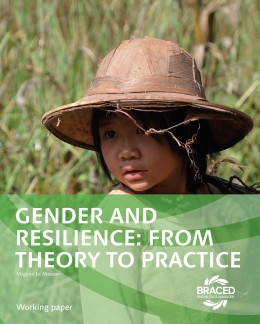Gender and resilience: From theory to practice
- Inicie sesión o regístrese para comentar
This paper presents a synthesis of four case studies documenting strategies towards building gender equality through resilience projects. It draws on the experience of non-governmental organisations (NGOs) involved in the implementation of the Building Resilience and Adaptation to Climate Extremes and Disasters (BRACED) projects: Mercy Corps (Uganda), ActionAid (Myanmar), Concern (Sudan/Chad) and Christian Aid and King’s College London (Burkina Faso). The analysis also reflects on discussions held during a writeshop that brought together NGO practitioners, donor representatives and researchers, to examine different approaches to integrate gender and social equality as part of efforts to build communities’ resilience to climate change and disasters.
The papers seeks to document how gender inequalities manifest themselves in all four contexts affected by climate change; how gender is conceptualised in project theories of change (ToCs); the operationalisation of objectives to tackle gender inequalities; internal and external obstacles to the implementation of gendersensitive activities; and drivers that help NGOs transform gender relations and build resilience.
The four case studies describe how disasters and climate change affect gender groups in different ways and also underscore the patriarchal social norms that disproportionately restrict women and girls’ equal access to rights and resources. The resulting inequalities are likely to undermine women and girls’ resilience, and ultimately that of their households and communities – an assumption that underpins projects’ ToCs. Hence, projects that aim to enhance people’s resilience capacities have to recognise social diversities, inequalities and their inter-sectionality. If they fail to do so, they risk further marginalising and undermining the capacities of those who lack access to decision-making or experience discrimination. Based on lessons from NGOs’ experience, and challenges they face in the particular contexts where they operate, this papers aims to inform practitioners on how to draw on promising practices to make resilience projects inclusive and equitable. It also provides a set of recommendations to point out areas where further research is required to increase understanding of resilience to climate extremes and longer-term changes, and to suggest how donors and funding can best support efforts to build communities’ resilience.

